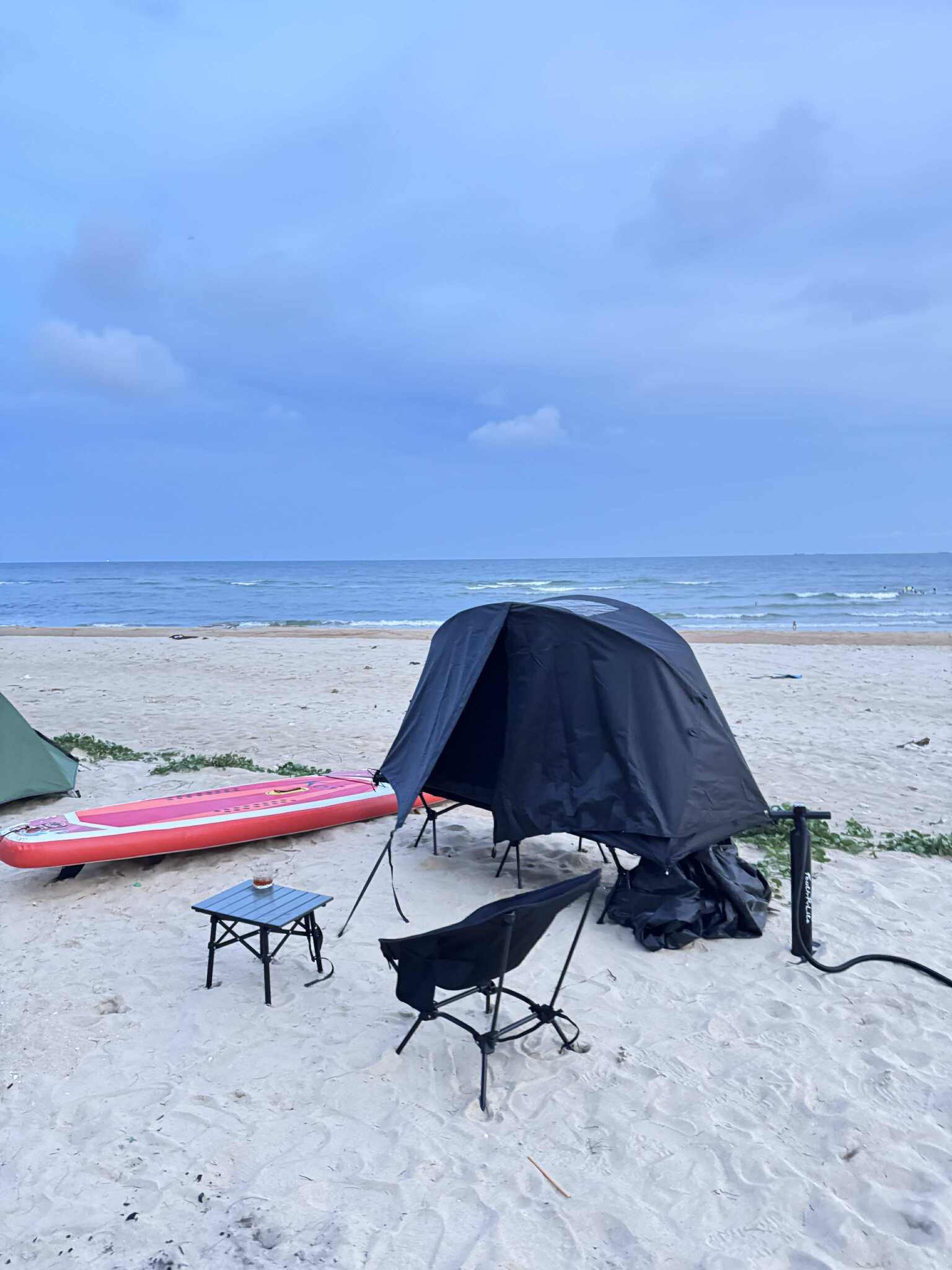
On weekends, Hung often invites friends or rides his motorbike alone to pristine, scenic spots in Dong Nai, Ba Ria – Vung Tau, Binh Thuan, and other localities for camping, stream bathing, sea SUP boarding, and watching sunrises and sunsets.
Recently, for solo trips, Hung has been using a compact tent-bed combo, fit for one person, instead of bulky camping gear. The set includes a folding bed and a 2-layer tent.
The folding bed has high legs, and can be set up on complex terrains such as undulating rocks, wet land, and beach sand. The tent has one layer of protective mesh against insects and one outer layer to protect against rain and wind.
In the camping community, many people prefer this type of tent combined with a folding bed because it is easy to carry by motorbike, or bring along on hiking trips.
It is also good for people who travel in a large group but still want a private resting space.
"The tent weighs only about 2.4kg. The cost of my tent bed is nearly VND5 million. The bed is VND1.9 million, the insect-proof tent is VND1.8 million and the rain-proof tent is VND1.1 million. The bed is designed to be sturdy, creating a feeling of security and comfort compared to sleeping on a mat or canvas close to the ground, and there is no worry about moisture," Hung said.
When folded, the compact tent-bed measures 18cm wide, 55cm long, and 18cm high.
"Since getting this convenient tent-bed, I have slept by the sea, streams, or in forests. Each weekend trip costs only VND300,000-400,000 since I don’t need to pay for lodging," Hung said.
Hung’s frequent solo camping spots are Tri An Lake (Dong Nai) and La Ngau Stream (Binh Thuan). Recently, he brought his "ultra-small, ultra-light house" to Ho Coc (Ba Ria – Vung Tau) and Ma Da Forest (Dong Nai).
Located about 60km from Vung Tau city center and 125km southeast of HCM City, Ho Coc is a small, pristine, uncrowded beach in Xuyen Moc District, Ba Ria – Vung Tau.
Nestled by a forest edge, far from residential areas, it offers a tranquil setting with clear blue water, clean shores, and uniquely shaped rocks.
When Hung started camping, he used to "bring everything he had," resulting in bulky, cumbersome gear. His first long-distance hiking and camping trip was along Ta Nang –Phan Dung trail, a stunning 35km trekking route crossing the borders of Lam Dong, Ninh Thuan, and Binh Thuan provinces.
"We’d never trekked Ta Nang – Phan Dung but we were overconfident, going without a guide. I carried tons of camping gear, and after just a few kilometers, I felt weighed down and exhausted," Hung recounted.
The trail had many forks, and they quickly got lost, with no phone signal. "We decided to climb the highest hill for a better view to locate the bald hill we aimed to conquer. But when we got there, dense trees blocked the view entirely,” he recalled.
Exhausted, they set up tents, laid out mats, cooked lunch, and then fell asleep because they were so tired.
"About an hour later, our group heard the sound of motorbikes. It turned out to be people going to the fields. Our group shouted loudly and ran out to ask for help. Following their instructions, at 5pm, we arrived at the three-province landmark. This was truly an unforgettable experience," Hung said.
To have a smooth camping trip, Hung always calculates what items to bring, an appropriate menu and schedule. "Regularly going camping makes me more organized and I arrange everything scientifically," Hung said.
Although he loves camping in the wild, Hung said he still chooses safe areas, not too far from where people live, and avoids going on rainy days or in unfavorable weather.
Camping tourism is increasingly chosen by young people, especially young families, to satisfy their wanderlust.
Unlike the comfort of luxury, well-equipped resorts, camping offers travelers unusual experiences, allowing them to freely immerse themselves in nature’s vast spaces, listen to the whispers of trees and rivers, and leave behind the hustle and bustle to recharge with the pure, refreshing energy of the natural world.
Linh Trang